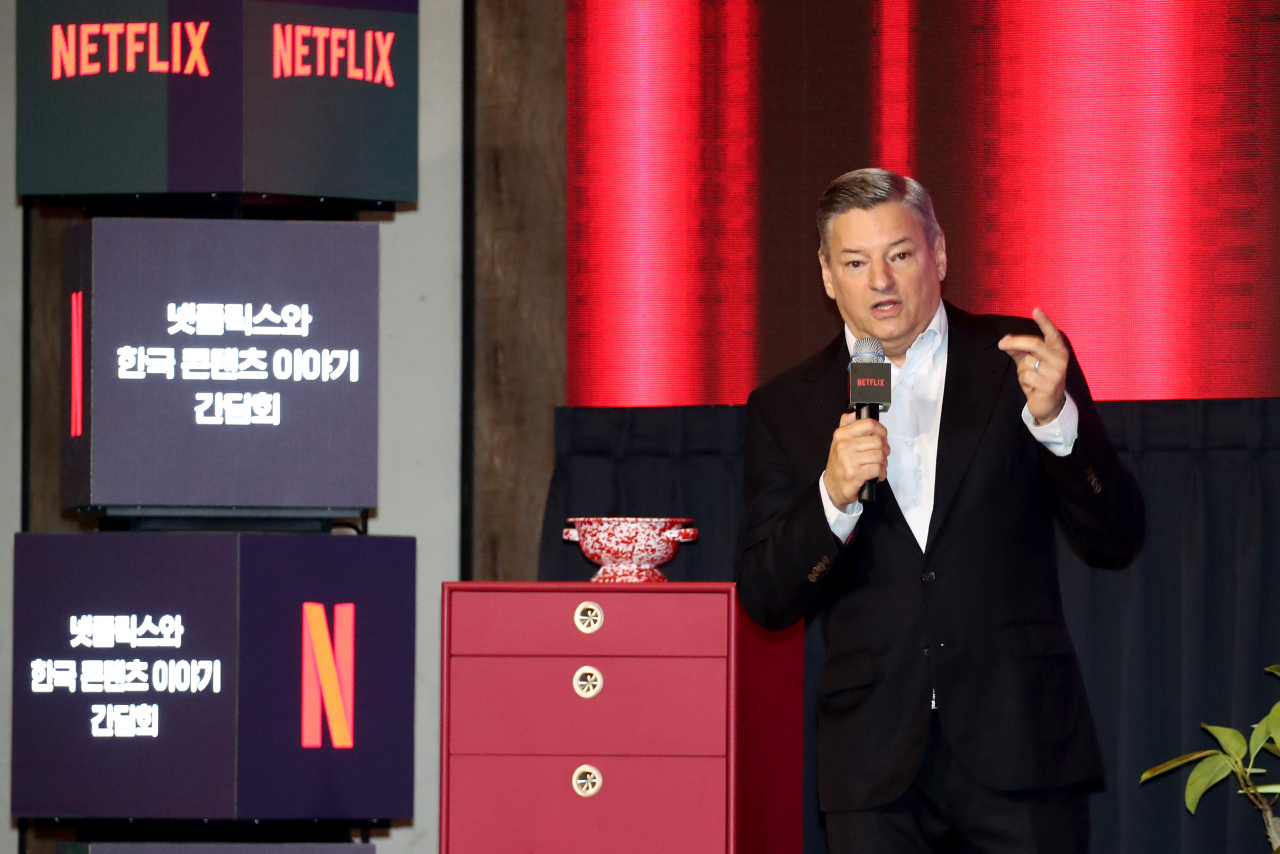 |
Netflix co-CEO Ted Sarandos speaks during a press conference held at Four Seasons Hotel in Seoul, Thursday. (Yonhap) |
Netflix co-CEO Ted Sarandos, in South Korea for the first time in seven years, on Thursday spoke about the US streaming giant’s interest in Korean content and what its partnerships with local production and VFX firms could lead to.
Almost 200 local reporters gathered to hear the details of Netflix’s $2.5 billion investment plan in Korea over the next four years, but details were scant.
“It’s been an amazing partnership between the Korean creative community and Netflix. But I believe we’re just scratching the surface of what’s possible. It’s why Netflix is investing for the long term,” Sarandos told reporters during a press conference held at Four Seasons Hotel in Seoul.
“Over the next four years, we will invest $2.5 billion in Korea. That’s roughly twice as much as we’ve invested since we first launched our service here in 2016. And it includes funding for training programs for the next generation of creators in front of and behind the camera,” he added, referring to an all-encompassing investment in different genres and formats.
In April, Sarandos made a surprise announcement during his meeting with South Korean President Yoon Suk Yeol, who was in Washington for a US state visit, that the US streaming giant would invest $2.5 billion in Korean content over the next four years.
Sarandos is known to have spearheaded the production of Netflix’s very first international original film, “Okja,” directed by Bong Joon-ho, which doubled the number of Netflix subscribers in Korea to more than 200,000 in 2017.
Those who expected Sarandos to share more details about the investment plan, given his experience in working with the local industry, were left disappointed.
In 2021, Netflix said it had invested 500 billion won in Korea and the company is estimated to have invested 500 billion won to 800 billion won each year since then. If Netflix were to invest on a similar scale over the next four years, that would amount to almost 3.2 trillion won, which is close to the $2.5 billion that Sarandos pledged in April.
But whether Sarandos’ announcement is welcome news to the South Korean creative content industry -- with filmmakers in particular suffering financially as fewer people have been watching movies in theaters since the pandemic broke out -- is still being debated.
Sarandos briefly mentioned how Netflix will collaborate with the local industry, saying that the platform will discover talent both in front of and behind the camera.
“Between 2022 and 2025, for example, one in five Netflix titles in Korea will have come from a first-time writer or director,” he said.
Asked about the company's crackdown on password sharing -- the company began to charge $8 for account sharing in the US last month -- the 23-year Netflix veteran said, “It’s a global initiative so over the next couple of months we will announce, 'It’s coming soon,' but I’m not announcing anything today,” he said.
On the issue of Netflix not paying for network usage despite generating explosive traffic here, Sarandos said the net neutrality issue shouldn't be called a “conflict” but rather an “opportunity.”
Netflix has been embroiled in a lawsuit with South Korean internet service provider SK Broadband, which argues the streaming service owes it fees for using its network. The lawsuit is ongoing as Netflix has appealed the Seoul Central District Court ruling that decided in SK Broadband's favor.
“I would say that there’s opportunity as businesses evolve. There’s a clear, direct and symbiotic relationship between creative companies like ours and internet industries,” Sarandos told reporters.
“(It’s) the opportunity to work together to create a better consumer experience for the internet, for content, for the general joy of consumers is something we should be doing together,” he said.
Despite Netflix’s continued interest and investment in K-content, its plans to grow together with the local entertainment industry need to be more concrete, based on the impact it has on the local audience and industry.
South Korean content has taken the world by storm with more than 60 percent of Netflix viewers having watched a Korean show in 2022, according to company data.
A 2021 report showed that with “Squid Game” alone, the US streaming giant raked in over $900 million in profits, after spending about $21.4 million on the production of the nine-episode series.







![[Today’s K-pop] Blackpink’s Jennie, Lisa invited to Coachella as solo acts](http://res.heraldm.com/phpwas/restmb_idxmake.php?idx=644&simg=/content/image/2024/11/21/20241121050099_0.jpg)